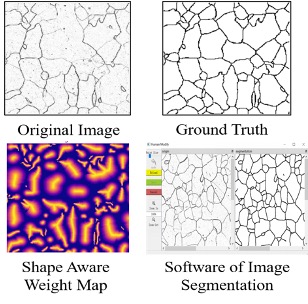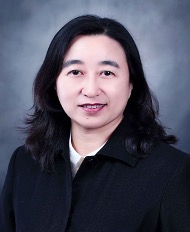Deep Learning and Shape Aware Based
Image Segmentation for Polycrystalline Micrographic image
Xiaojuan
Ban*, Haiyou Huang*, Boyuan
Ma, Hao Wang, Weihua Xue
University
of Science and Technology Beijing, Beijing, 100083, China
ABSTRACT: The rapid and accurate
establishment of the intrinsic relationship of material composition, process,
microstructure and properties is the basis of material performance improvement,
quality control and material design. Machine learning technology recently has
made significant progress in the analysis and mining of structural data. At the
same time, for the quantitative analysis of material organization structure
presented by unstructured image data, the deep learning technology represented by
convolutional neural network has been widely used. Taking Fig. 1 as an example,
the algorithm needs to extract and separate each grain accurately to provide
support for subsequent analysis of geometric and topological information of
grains. However, the grains have similar appearance and complex shape. Due to
its similar appearance of each grain, the traditional image segmentation method
based on color or threshold is difficult to separate the grain by grain. To
solve the above problems, the contributions of this work are: 1) we present a
shape aware based deep convolution network, which can lead the convolutional
neural network to pay more attention to the shape information in the training
process, so as to obtain more accurate image segmentation results; 2) We
summarize and discuss the evaluation metrics for image segmentation, and analyze
different segmentation algorithms and typical noises through experiments.
Finally, the advantages and applicability of various evaluation methods are
compared and discussed; 3) We develop an image segmentation software based on
deep learning, and propose the design principles of the software for material
microscopic image analysis.

Keywords: Material Microscopic Image Analysis; Polycrystalline materials; Deep Learning; Image Segmentation; Objective Function;

Xiaojuan Ban has completed her PhD from University of Science and Technology in Beijing, China. She is the professor and doctoral advisor and has engaged in artificial intelligence and computer vision research for more than 20 years. She won 4 awards of scientific research and teaching at provincial and ministerial level, and published more than 300 papers in the conferences and journals, such as ‘NPJ Computational Materials’, ‘Journal of Microscopy’, ‘Computational Material Science’, ‘Micron’, ‘Chinese Journal of Engineering’, ‘Journal of Software’, and ‘Chinese Journal of Computers’.